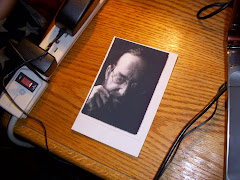There’s other profit in this northward thrust for freedom, past jangling pockets: it’s probably stayed, momentarily, the
shrill song of revolution, whistled loudly south of Texas, all the way to Patagonia. If self-determination explodes en masse within the Latino hinterland—“Diós no la permita! No más La Guerra, por favor!” I cry to mis hijos!--forget the North American economy. Prices would most likely blow sky-high—30 bucks a pound for coffee!—and manufactory, pretty thin already, would probably fail for lack of materials , if multinationals had to pay real value for goods produced by multi-millions of food slaves for the Giants’ local suppliers. Convenient for the MNCs, who practice denial in the mirror about the slaves indirectly feeding them—“What slaves? In the internet Age? Absurd!”--while working on their golden parachutes. For minerals to factor our machines; for coffee; for sugar to make our booze; for cotton and tobacco; for fruit, flowers, beef and timber; even for our illicit drugs: for this handmade bonanza, up to 70% in some southern populations sweat for tin pennies, gone before they’ve finished being hungry.
We take this cheap flow of manna for granted, but these hungry campesinos, if denied the “out” of hope trips up to the northern castle, would simply not take nada for their work any longer. “Life’s too short,” they say, “I’ve got to follow my dream.” I can’t imagine where they might’ve picked up that slogan. Perhaps, I let it slip into the family patois, myself, an inveterate dream-tender. That potential possibility, alone, of touching the goose egg, keeps my older hijos teotanos, born fatherless to my sisters, ten years after the Contra terror, from piling barricadas in the streets of Managua, as did their fathers and mothers, 30 years ago, against the same economic tyranny. We would, too, if it came to that: that’s why our mostly-peasant ancestors got sweaty to come to America, and why our earliest patriots died. It’s a noble heritage to rise to, being scions of revolutionaries, one we share with Nicaraguan campesinos. Since the bloody 60’s, though, we’ve mostly forgotten that.
By the by, amigos, revolutions in the Internet Age probably won’t be locally-contained events, as in the past. Peasants, here, formerly land-locked in this remote mountain valley, are talking to their counterparts in Mexico and Peru, by email; they also speak as one, in halting English, with Africans and Asians, sharing photos of common inequities and luxury dreams, beyond language, building trans-cultural identity while fanning their desire for golden assets. The Internet’s just a bus ride and ten pesos away. It doesn’t judge them down based on national, racial, ethnocentric or financial myths. It’s worth a loaf of sweet bread, but it’s got more value. It could swell to a campesino chorus, a la Ernesto Cardenál, for redress. An awaking new Giant, I’m thinking.
They think it’s way past time for change, with very good logic. Like campesinos everywhere, they know, through millennia of pain, when they’re replanting in a changing campo, it’s more pragmatic to grow beans with hands down deep in the fairgrounds of their souls, con la gracia de Diós, the richest tierra, with special, sequestered seed from tender-loving gardens, than to risk the taint of frijoles or bancos or burócratas from the worldly, festering mercado.
Saturday, February 23, 2008
Subscribe to:
Post Comments (Atom)
















































































No comments:
Post a Comment